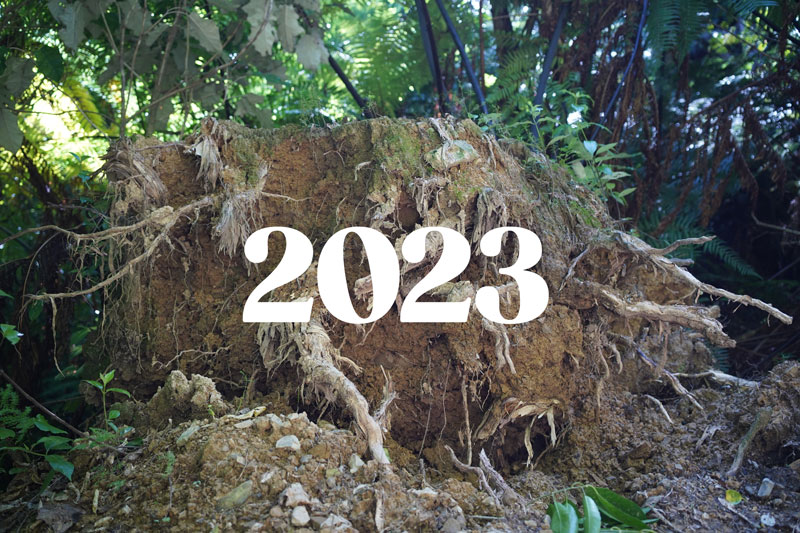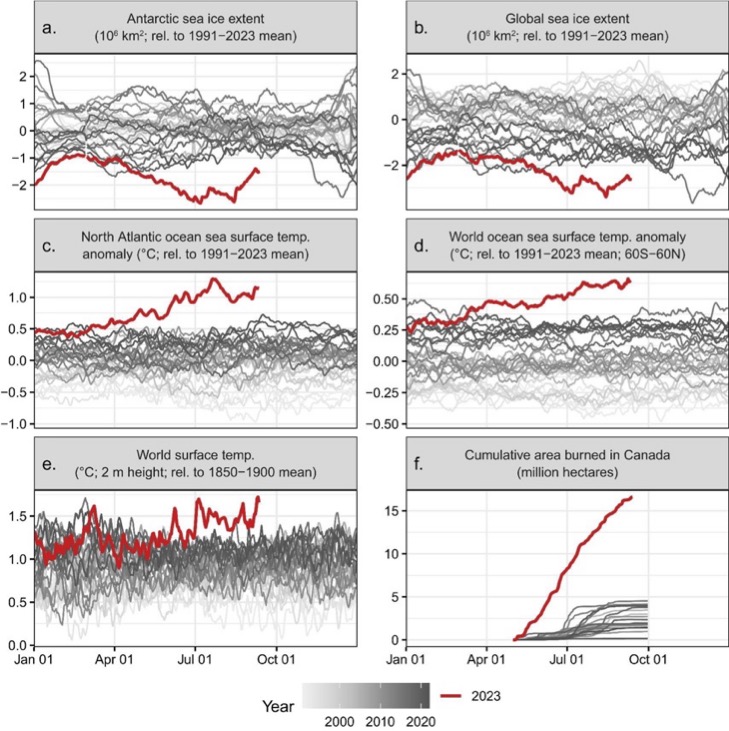author
Jacques Lawinski
post
- 14/12/2023
- No Comments
- Ecology
share
A wrap-up of 2023’s major climate events.

Image: AI-created on perchance.org
Global trends
We had multiple days in 2023 where global temperatures were more than 2˚C greater than pre-industrial levels. The Paris Agreement states that governments should aim to keep global warming to a maximum of 1.5˚C, so this trend of increasing temperatures is alarming.
The estimation for this year’s average temperatures is around +1.40˚ – 1.46˚C above pre-industrial norms, +0.13˚C higher than the hottest year on record, 2016. This will make 2023 the hottest year since records began.
In terms of carbon dioxide, levels in the atmosphere are 50% higher than pre-industrial levels.
Scientists across the globe are alarmed at the rate of change in climatic conditions shown in 2023. They are concerned because 20 of the 35 different “vital signs” for the health of the planetary system are now at record extreme levels. Read the Plurality.eco article about this here.

Month by month
In February, Cyclone Gabrielle hit the upper North Island of New Zealand, causing severe damage to homes and agricultural land. It was declared the worst storm to hit New Zealand this century.
In March, Cyclone Freddy hit Madagascar, Mozambique and Malawi, causing severe damage, and affecting hundreds of thousands of people. Cyclone Freddy travelled 10,000km over 35 days, making it the longest, and also the most powerful storm ever recorded. Mozambique received the same amount of rain in one month that it would normally get in a year.
Long-term drought conditions continued to worsen in Central and South America, with rainfall 20-50% lower than normal in the first half of the year.
Record-breaking temperatures were recorded in Tunisia, Morocco, and Algeria, with temperatures reaching 49-50˚C in July.
The deadliest wildfire in more than 100 years of US history occurred in Hawaii at the beginning of August. At least 99 people lost their lives, and whole towns were burned to the ground.
June-July-August 2023, the summer months in the Northern Hemisphere, were the hottest experienced on Earth for at least the past 120,000 years. The average global temperature was 16.77˚C.
In September, Cyclone Daniel caused extreme rainfall and flooding in Greece, Turkey, Libya and Bulgaria, with a heavy loss of lives in Libya in September.
October was the most humid month since weather records began. This is due to higher-than-normal global temperatures and the El Nino weather event.
The COP28 conference finished mid-December in the United Arab Emirates, where the major discussion was about the phase-out of fossil fuels. 2,500 fossil-fuel lobbyists attended the conference. The President of the Conference, the Sultan Al Jaber, declared that there was no scientific proof behind the phase-out of fossil fuels. The Conference is, despite this, one of the only places where each country can have its voice heard, including developing countries who often speak about climate justice.
The World Meteorological Association provided an overview of climate events in 2023 here.
You're reading an article on Plurality.eco, a site dedicated to understanding the ecological crisis. All our articles are free, without advertising. To stay up to date with what we publish, enter your email address below.
It’s easy to forget the climate events that have happened this year, especially when news cycles are so short, and new information and events are appearing each day. Taking the time to look at events such as climate change over the space of a year can help us to understand just how this phenomenon is affecting us, across the world. Climate change is not coming, it is most certainly already here. As the IPCC’s Sixth Synthesis Report pointed out, it’s what we do now that will determine how bad the effects will be in the coming years.
More on climate science...
To understand more about the climate crisis, and the larger ecological crisis, read our article What is the Ecological Crisis here.
To read about the climate science that we currently have, from the IPCC report earlier this year, read our summary article here.
To read about what we know about biodiversity and ecosystem services, check out our article on the IPBES report here.
You can also donate to Plurality.eco, to support articles like this breaking down climate science and bringing a balanced perspective to the climate debate.
It took more than 30 hours of research and writing to produce this article, which will always be open and free for everyone to read, without any advertising.
All our articles are freely accessible because we believe that everyone needs to be able to access to a source of coherent and easy to understand information on the ecological crisis. This challenge that confronts us all will only be properly addressed when we understand what the problems are and where they come from.
If you've learned something today, please consider donating, to help us produce more great articles and share this knowledge with a wider audience.
Why plurality.eco?
Our environment is more than a resource to be exploited. Human beings are not the ‘masters of nature,’ and cannot think they are managers of everything around them. Plurality is about finding a wealth of ideas to help us cope with the ecological crisis which we have to confront now, and in the coming decades. We all need to understand what is at stake, and create new ways of being in the world, new dreams for ourselves, that recognise this uncertain future.
On social media
Need some help to get to the next stage of your ecological journey?
Copyright © Plurality.eco 2024

